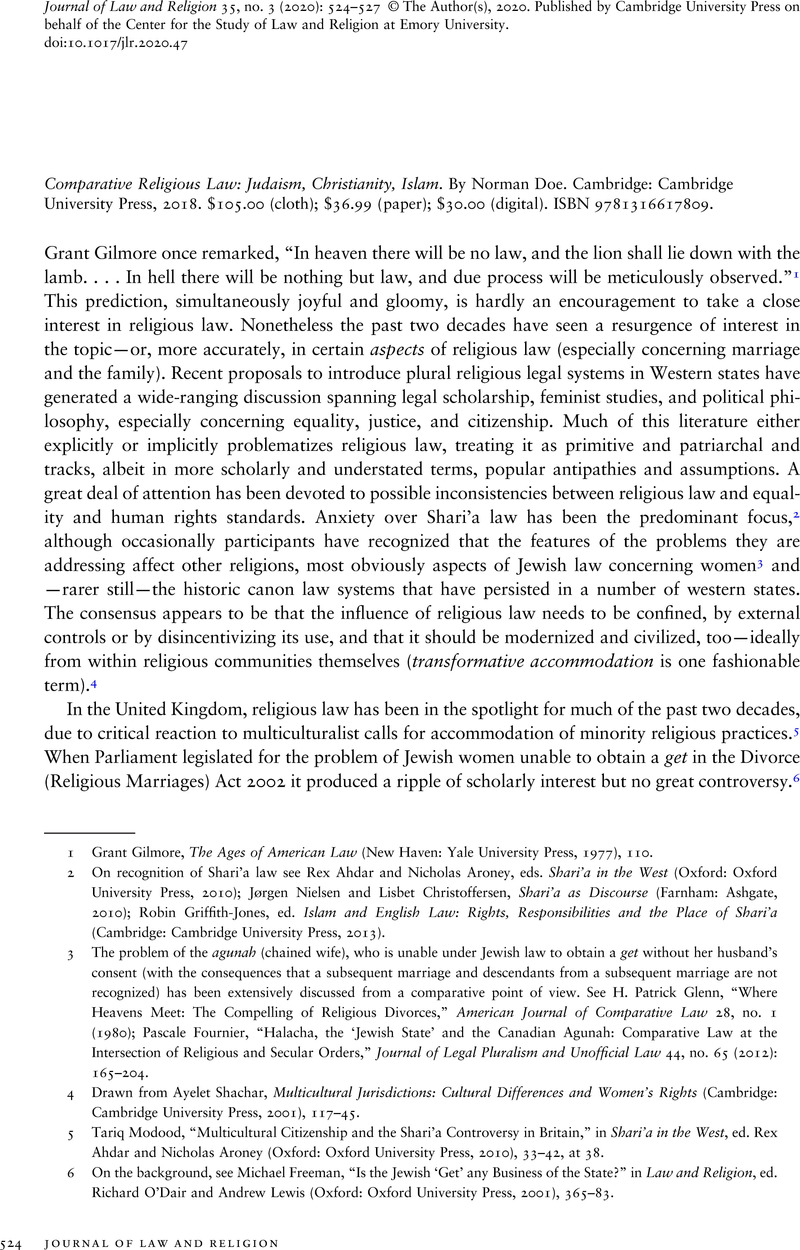No CrossRef data available.
Published online by Cambridge University Press: 28 December 2020

1 Gilmore, Grant, The Ages of American Law (New Haven: Yale University Press, 1977), 110Google Scholar.
2 On recognition of Shari'a law see Ahdar, Rex and Aroney, Nicholas, eds. Shari'a in the West (Oxford: Oxford University Press, 2010)Google Scholar; Nielsen, Jørgen and Christoffersen, Lisbet, Shari'a as Discourse (Farnham: Ashgate, 2010)Google Scholar; Griffith-Jones, Robin, ed. Islam and English Law: Rights, Responsibilities and the Place of Shari'a (Cambridge: Cambridge University Press, 2013)CrossRefGoogle Scholar.
3 The problem of the agunah (chained wife), who is unable under Jewish law to obtain a get without her husband's consent (with the consequences that a subsequent marriage and descendants from a subsequent marriage are not recognized) has been extensively discussed from a comparative point of view. See Glenn, H. Patrick, “Where Heavens Meet: The Compelling of Religious Divorces,” American Journal of Comparative Law 28, no. 1 (1980)CrossRefGoogle Scholar; Fournier, Pascale, “Halacha, the ‘Jewish State’ and the Canadian Agunah: Comparative Law at the Intersection of Religious and Secular Orders,” Journal of Legal Pluralism and Unofficial Law 44, no. 65 (2012): 165–204CrossRefGoogle Scholar.
4 Drawn from Ayelet Shachar, Multicultural Jurisdictions: Cultural Differences and Women's Rights (Cambridge: Cambridge University Press, 2001), 117–45.
5 Tariq Modood, “Multicultural Citizenship and the Shari'a Controversy in Britain,” in Shari'a in the West, ed. Rex Ahdar and Nicholas Aroney (Oxford: Oxford University Press, 2010), 33–42, at 38.
6 On the background, see Michael Freeman, “Is the Jewish ‘Get’ any Business of the State?” in Law and Religion, ed. Richard O'Dair and Andrew Lewis (Oxford: Oxford University Press, 2001), 365–83.
7 Rowan Williams, “Civil and Religious Law in England: A Religious Perspective,” Ecclesiastical Law Journal 10, no. 3 (2008): 262–82. For discussion, see Samia Bano, “In Pursuit of Religious and Legal Diversity: A Response to the Archbishop of Canterbury and the ‘Sharia Debate’ in Britain,” Ecclesiastical Law Journal 10, no. 3 (2008): 283–309; Adam James Tucker, “The Archbishop's Unsatisfactory Legal Pluralism,” Public Law, no. 3 (2008): 463–69.
8 Notably, Dennis MacEion, Sharia Law or “One Law for All?” ed. David G. Green (London: Civitas: Institute for the Study of Civil Society, 2009), and in the successive Arbitration and Mediation Services (Equality) Bills unsuccessfully introduced at Westminster by Baroness Cox. For discussion see Ralph Grillo, Muslim Families, Politics and the Law: A Legal Industry in Multicultural Britain (New York: Routledge, 2016), 13–38.
9 The Independent Review of the Application of Sharia Law in England and Wales, Cm. 9560 (Feb. 2018).
10 See, for example, Maleiha Malik, “Minorities and Law: Past and Present,” Current Legal Problems 67, no. 1 (2014): 67–98; Lorenzo Zucca, A Secular Europe: Law and Religion in the European Constitutional Landscape (Oxford: Oxford University Press, 2012), 119–32; Ran Hirschl and Ayelet Shachar, “Competing Orders? The Challenge of Religion to Modern Constitutionalism,” University of Chicago Law Review 85, no. 2 (2018): 425–55.
11 Previous comparative work has had a narrower focus. See, for example, Michael J. Broyde, Sharia Tribunals, Rabbinical Courts and Christian Panels: Religious Arbitration in America and the West (New York: Oxford University Press, 2017); Yuksel Sezgin, Human Rights under State-Enforced Religious Family Laws in Israel, Egypt and India (Cambridge: Cambridge University Press, 2013).
12 Respectively, Norman Doe, The Legal Framework of the Church of England (Oxford: Clarendon Press, 1996); Norman Doe, Canon Law in the Anglican Communion: A Worldwide Perspective (Oxford: Oxford University Press, 1998); Norman Doe, The Law of the Church in Wales (Cardiff: University of Wales Press, 2002); Norman Doe, Christian Law: Contemporary Principles (Cambridge: Cambridge University Press, 2013).
13 Much UK-based scholarship is focused on Sharia Councils, either in their own right or by comparison to tribunals from other religions dealing with matrimonial breakdown. See Bano, Samia, Muslim Women and Shari'ah Councils: Transcending the Boundaries of Community and Law (Hampshire: Palgrave Macmillan, 2012)CrossRefGoogle Scholar; Douglas, Gillian et al. , “Marriage and Divorce in Religious Courts: A Case Study” Family Law 41, no. 9 (2011): 956–61Google Scholar; Douglas, Gillian et al. , “The Role of Religious Tribunals in Regulating Marriage and Divorce,” Child and Family Law Quarterly 24, no. 2 (2012): 139–57Google Scholar.
14 McCrea, Ronan, “Why the Role of Religious Tribunals in the Legal System Should Not Be Expanded,” Public Law, no. 2 (2016): 214–22Google Scholar.